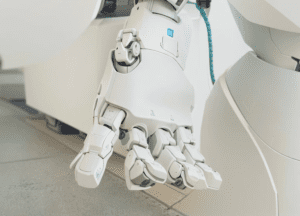
Introduction to AI Transformation in Business
AI Transformation in Business is growing at a fast pace and scenarios of further improvements are expected shortly. Moving to the future, the application of AI in the business environment will evolve to a higher level of control and efficiency.
The Evolution and Adaptation of AI
AI integration in business has advanced from its first days as mere automation. The future of AI will reveal that higher-class technologies of AI like machine learning, natural language processing, and predictive analysis will be integrated into businesses. They shall play an important role in improving decision-making, operations of supply chains, and interactions with clients. Thus, given the continuous advancement of AI, it will determine new trends in business, the way it meets the market needs, and out-compete its rivals.
Impact on Workforce and Employment
Another great area that will be significantly affected by the future changes in AI transformation in business will be the workforce. Desk work will become streamlined thus reducing the need for employment of large human resource personnel. Thereby, the transition to the post-automation world will require organizations to invest in re- and upskilling the workforce to become ready for the world of collaborative work with intelligent machines. Concerning the personal perspective, the workers will be required to become lifelong learners to remain relevant in the workforce.
Data-Driven Decision Making
In the future, AI transformation in business will depend on data-oriented processes as one of the key factors. It will help the business to gain insights from large amounts of data and make fast decisions independently. With this capability, companies will be able to adapt quickly and effectively to market trends and their consumers’ needs. This paper has been able to identify how data-driven AI will be influential in the future through; better business approaches, superior customer satisfaction, and higher profitability.
Ethical Considerations and Regulations
It has been seen that there is an ever-increasing trend of AI use in business, which raises significant ethical issues, and thus regulation will also become important. It will become necessary for enterprises to grapple with issues to do with data privacy, the fairness of algorithms, and the level of openness. In general, from a personal angle, the citizens /consumers and employees will pressure the organizations applying AI to exhibit higher levels of responsibility and ethical practice.
That being said, the future of the AI transformation of businesses will depend on the middle ground where technology will be utilized optimally while at the same time being anchored on the trust of the public and legal frameworks.
Current State of AI in Business
AI Transformation in Business and Future Influence- From a Personal Standpoint is a topic that in the current world is receiving a lot of negative attention. Looking forward, the possibilities of changing business processes with the help of AI are virtually limitless, paving the way for incredible advancements. With the increasing implementation of Advanced Intelligent systems in business organizations, various functions are expected to experience the following transformations.
Enhanced Decision Making
Due to advanced cognitive computational methods, organizations can obtain improved ways of decision-making. Big data analytics, specifically predictive analytics that is driven by artificial intelligence, can anticipate market trends, and customers’ preferences, as well as operational effectiveness, which increases a company’s competitive advantage.
Personalized Customer Experiences
AI integration in the business world will redesign the types of relationships organizations share with customers. AI can sort through large quantities of information and help in offering the right suggestions and solutions based on previous buyer experience and behavior while making a purchase, thus helping in getting a good reaction from buyers, appropriate marketing methods, and optimum customer satisfaction.
Automation of Routine Tasks
Perhaps one of the first noteworthy consequences will be the actual possibility of automating various common and periodical activities. This shall enable man to embrace the medium and unconventional tasks, to improve core competencies and promote organizational innovation.
Innovative Product Development
Thus specialty is expected to arise in all aspects of product development, including artificial intelligence. From adapting key features to the users through data mining to estimating the success of products in the market through data mining, businesses will be able to design products that fit the needs and wants of the consumer.
Improved Operational Efficiency
Supply chain, inventory, and operations can be managed using AI resulting in massive cost reduction, and high efficiency. Therefore, the opportunities for AI transformation in business are still rich and can greatly change industries.
Ethical Considerations and Challenges
Thus when the application of AI continues to advance more ethical questions and concerns will be required to be met. Businesses must guarantee that such applications meet the standards of fairness and do not escalate inequalities. Another factor that will define the future of AI applications in various business facets is the relevant and sensible utilization of AI to produce more acceptable and credible outcomes for customers.
Key Drivers of AI Transformation in Business
The use of AI in Business is now undergoing a rapid transformation that pushes organizations process towards higher levels of innovation and productivity. Being so important in business today, AI technologies are expected to be even more important as they continue to develop.
Personalized Customer Experiences
AI Transformation in Business helps establish a more extensive focus on customer experiences. Cognitive methods enable firms to analyze customer twenty-four-seven and adjust their services and product offerings based on that analysis. The outcome is enhanced satisfaction and an increased likelihood that the client will continue using the services.
Enhanced Decision-Making
The areas for AI advancement in the future will be the further use of AI for business decisions. Due to the ability of AI to examine a massive quantity of information and process it in real-time, it may offer precious information that permits the correct and timely selection of an essential company path. This has the effect of increasing rivalry and promotes the expansion of business.
Operational Efficiency
The periodical AI Transformation in Business is expected to drastically change the efficiency of business in the future. Among the potential benefits, the prioritization of people over machines can also be numbered as the possibility to outsource monotonous activities to machines, let the employees deal with more creative problems. This also helps in increasing production as well as reducing frustration as monotonous work is eliminated.
Innovation and Product Development
AI will remain the driving force for innovations and new product creation. Employers are going to apply AI in the analysis of market conditions, demand forecasts, and the creation of new products to satisfy customer demand. This timely approach allows companies to be in a vantage position though most of the time they are playing catch up.
Future Influence – From a Personal Standpoint
Analyzing the influence of AI transformation on business from the perspective of an individual, it is possible to conclude that the given field will give a boost to the development of entrepreneurship and small businesses since they will finally get a chance to access such tools that have been initially provided to large companies only. This democratization of technology will lead to uplifting the advancement of technology to various tiers in the firm.
Emerging AI Technologies Shaping the Future
AI transformation in Business is currently one of the most elaborated subjects among the leaders and entrepreneurs of different companies and organizations. Thinking ahead, it is possible to conclude that AI will be at the forefront of organizational change in terms of functioning and communication with customers and other partners in the process of creating value and growth. This is not a transition to implementing new approaches to technology; it is about utilizing artificial intelligence to design intelligent processes in commerce.
Enhanced Customer Experiences
The field of AI transformation in Business is designed to change how customers are being managed. With the help of algorithms and natural language processing, it is possible to provide exceptional, individualized experiences. Starting from the chatbots that offer customers immediate assistance and going up to the recommendation systems that introduce clients to products and services that may be necessary in a given period, AI will only improve satisfaction and loyalty.
Operational Efficiency and Automation
Other areas that are envisaged in the AI Transformation in Business are significant enhancement of operation efficiency. Such applications as robotic process automation (RPA) will allow reducing the number of errors and the time spent on repetitive work while increasing the productivity of the employees. These changes shall improve efficiency and hence spawn cost reduction.
Data-Driven Decision Making
AI Transformation in Business shall lead to better decision-making as well as faster decision-making. This provides real-time analysis of huge amounts of data that can lead to the making of informed decisions by the business organization. Such a tool, for example, is Predictive analytics; it is the anticipation of market changes, and customer behavior and is therefore competitive advantage.
Innovation and Product Development
Without question, AI plays an extremely significant role in the process of innovation. Organizations will deploy AI at different stages in the development of commercial goods and services. AI will also improve the design and simulation tools and lead to quicker development; the ability of AI to analyze user feedback in real-time shall also assist in optimizing the products’ interface to meet consumers’ needs.
Ethical Issues and their Effects on the Employees
Hence, while embracing AI Transformation in Business, its moral implication and its effect on the working population too should not be ignored. Several guiding principles on how AI can be utilized responsibly must be followed by corporations, which include fairness, explain ability, and legitimacy. Finally, the business must encourage executive education programs to prepare the employees for the new order of things brought about by AI.
Potential Benefits of AI Transformation in Business
Business AI Transformation is altering industries beyond what is imaginable at an incredibly fast rate. This leads to the future of AI’s influence on the business scenario or the topic of interest holds a lot of promise when it comes to growth, efficiency, and innovation. Onto the possible advantages which, with the help of detailed analysis, suggest what can be expected in the future.
Enhanced Operational Efficiency
Business AI disruption is pegged to revolutionize operational efficiency. With AI it is possible to eliminate time-consuming and repetitive tasks, as well as minimize errors in supply chain management. The fact is that with the further development of AI systems, corporations will be able to carry out multifunctional work and will progress on that point, which will bring them increased efficiency and flexibility.
Data-Driven Decision Making
It also applies to the MC program for the future influence of AI in business as a tool for enhancing decision-making. Large volumes of data can be processed by AI analytics to give detailed information that can help a business organization make the right decisions soon. Thus, AI approaches help companies analyze the patterns and outcomes, as well as adjust the strategies to fit market needs, achieving competitive advantage.
Personalized Customer Experiences
AI transformation in business is one of the most promising trends that will help to radically change the approach to customers. AI can adapt the suggestions based on the customers since patterns are analyzed by using complex equations and machine learning. It not only increases the level of satisfaction of the customers but also makes them loyal to the particular product hence enhancing the sales of that particular product. Organizations that incorporate the use of AI will be in a position to estimate and satisfy customer needs incredibly.
Innovative Product and Service Development
It is evident that the variety and overall growth of advanced intelligence, play a major role in shaping the business’s future. AI can help in identifying new potential products and services to offer with the assistance of the recognition of gaps within the market or unsatisfied customers’ needs. Further, in the case of design and testing of new innovative solutions, AI can help to check if the new ideas are feasible and attractive. As the incorporation of AI increases, organizations adopting AI will be among the frontrunners in the given industries.
Workforce Empowerment
AI is often seen as the future laying its claim to reduce human employment, but, the tool has the capability of optimizing the workforce. AI can perform routine work, thus eliminating extensive use of employee’s time by the organization to accomplish simple but time-consuming tasks. Therefore, the future impact of AI in business will generate new jobs and necessitate the need to acquire new abilities, which will help build a more complex and creative workforce.
Challenges and Risks of AI Transformation
AI transformation in business and the future influence from a personal standpoint is a topic that is changing at a very fast rate. However, the process towards complete implementation of AI systems is marked with various difficulties and threats. From matters of data privacy to such areas as training and development needs, various pitfalls have to be avoided if the benefits of AI are to be realized in businesses. A major issue often encountered in artificial intelligence-based business changes is the privacy and security of data.
In today’s world of business, the magnitude of the data collected and processed, it is crucial to safeguard this information from violation and misuse. It becomes essential for businesses to protect their data and customers’ information and act by data protection laws. Another highly relevant problem is the shortage of skilled workers. Thus, the application of artificial intelligence in a business environment is not possible without a skilled workforce in data science, machine learning, and AI ethics.
Employers need to ensure that they undertake organizational training and development processes so that employees acquire specific knowledge. This not only guarantees the effective integration of AI solutions but also contributes to the creation of an innovation and learning organization. Cost is also a major threat when it comes to AI transformation. Introducing AI technologies is costly, and its value doesn’t come quickly.
Executives need to contemplate further what type of AI strategies can ensure that short- and long-term goals of business companies are achievable and what are their consequences for the organization’s finances. Making certain rational decisions and reducing contemplated cost risks are some of the ways that various cost-benefit analyses can be of assistance. There are also several important ethical issues of AI transformation in business.
New arising issues include; how should AI systems be made more transparent, how to make the new systems more accountable, and the critical issue of bias in the AI systems. Therefore, the business needs to ensure that it develops and implements ethical standards and policies so that it can be able to maintain its ethical nature in the use of new technologies such as AI.
However, the future shifts in business by the integration of AI transformation will consist of an administrative form of impact. Because AI applications are increasingly becoming standardized, governments and international bodies are working on putting in place regulations that govern the usage of AI and hence companies need to be abreast with the rules set in place. Managing these regulations will be a work in progress as more adoptions occur and evolve.
Case Studies of Successful AI Transformation in Business
AI has already started making its mark in business and the change that AI is going to bring further will be even more profound. On this note, it is possible to assert that as different companies embrace advanced technologies, the possibilities of innovations as well as the optimization of processes increase dramatically.
Embracing AI for Competitive Advantage
Any firm that is seriously considering and implementing AI Transformation in Business will be putting their organizations ahead in a major league. The efficient use of AI technology can support improvements in business processes and the overall experiences of its clients and lead to the identification of new sources of revenues. This check portrays them as being prepared ahead of the market that is continuously being shaped by technological features.
The Role of AI in Enhancing Decision-Making
Another area of AI Transformation in Business that creates a significant effect is related to decision-making. The use of AI in decision-making gives more specifics that have not earlier been possible for a human to consider and therefore enables higher-level decisions to be made on them. The management of the company needs to foresee future market conditions with the help of this capability.
Future Influence – From a Personal Standpoint
From my vivid perspective, the future of AI Transformation Business is very promising from an individualistic angle. Thus, AI is not only about changing business processes but also the generation of new professions and career prospects. Flexibility and open-mindedness to learn will be the definitive success formula in harnessing these advancements in one’s as well as organizational benefit.
The Role of Ethics in AI Transformation
AI in Business Transformation is a dynamic and expanding domain that is fueling numerous industries and changing the whole operational model of organizations. Now that AI systems have evolved, the possibilities of utilizing them are almost endless, as they spearhead the period of innovation, improved productivity, and expansion. But at the same, one must not underestimate the ethical perspectives of using AI in business processes.
Ensuring Fairness and Transparency
Closely related to trust, one of the most significant problems to solve in the context of AI Transformation in Business is that of fairness. AI systems contain structural and procedural characteristics that should not allow any forms of prejudice and should treat all people fairly. Businesses are required to ensure that algorithms used to decide with the help of AI materials are understandable to other people.
Data Privacy and Security
The development of AI transformation in business also depends on how the companies address data privacy and security issues. The possible trends of AI Transformation in Business include whether companies will increase investments in AI research and development and how organizations will address AI biases and risks. Business entities must incorporate effective means to protect the company’s data. Particularly, the focus should be made on the question of how the information was collected, processed, and used, concerning the legislation and public morals.
Accountability and Responsibility
A primary fact, that has to be underlined as a priority in the case of AI transformation, is accountability. As a result, organizations have to define specific organizational accountability for AI-generated choices. This is towards developing guidelines for auditing AI systems and also for handling any negative side effects that may occur. Accountability should also refer to a process of periodic checks and adjustments based on the new recommendations and shifts in perception.
Human-Centric AI Development
AI Transformation in Business has to be driven and managed in a way that directs developments toward being human-centered. This means making AI extra-human to work hand in hand with human capabilities instead of coming up with solutions that are superhuman hence displacing humans from their positions. Executives need to pay more attention to developing corporate AI that brings improvements to employees’ performance and value to customers, alongside compliance with ethical norms.
Future Influence of AI Transformation in Business - From a Personal Standpoint
AI Transformation in Business and Future Influence- From a Personal Standpoint is a topic that should interest us all. AI is already becoming embedded in business at an unprecedented speed, which is transforming industries constantly and recalibrating our working environment. These transitional phase changes should be understood with reference to the macro and the personal.
Automation and Efficiency
Business leaders have long dreamt of an upgrade to their clerk systems for the organization, and the AI revolution pledged to do just that. Beginning from the customer service to the chatbots right down to the data analytics, businesses can optimise their processes and costs for innovative ones. Such a shift not only may help to minimize the costs but also it would also be beneficial for the customers as get quicker and more accurate answers.
Personalized Customer Experiences
Perhaps, the most significant benefit tied to the AI advancement in business is the possibility of crafting very localized and individualistic customers’ experiences. These AI algorithms work by processing input data and learning from that data the customer trends and habits. Therefore, it helps the businesses in providing product recommendations and services that are relevant to a particular customer thereby increasing the chances of its consumers to remain loyal to the particular business.
Data-Driven Decision Making
Introducing AI into decision-making means that decisions made today are more precise, and take into account values, data and information not considered before. Due to an increase in the use of AI tools, companies can analyze the big data for viable analysis, planning, and forecasting. This future influence of AI transformation in business implies that, more business decisions are being made out of updated data getting rid of human errors and boosting general business adaptability.
Workforce Evolution
It can be stated that the ideas of the AI transformation in the business have changed the modern workflow as well as the workforce. Some people are afraid of losing their jobs, at the same time it is important to notice new positions and possibilities. People are likely to have to reskill to work with the enhancement of Artificial Intelligence systems. It is also promoting a culture of training and developing new ideas and products at the workplace.
Ethical Considerations
The transition to AI in business is already under way, and as such, it is vital that ethical concerns are given priority. The use of AI has to be transparent, fair and account for itself. These ethical challenges have to be met to ensure that the different stakeholders and the society at large awards their trust to business organizations.
Conclusion and Future Outlook
AI Transformation in Business and Future Influence- From a Personal Standpoint can be considered a never-ending process that affects the corporate sphere. The introduction of artificial intelligence into the business world has been very crucial in changing the process of business and improving the experience of the customers.
Enhanced Operational Efficiency
How businesses use AI is largely to carry out minor tasks in organizations, which frees human resources to engage in more important tasks. Mobile working, business intelligence, and data management systems are only but some of the methods businesses are employing to thrive and increase their performance.
Personalized Customer Experiences
Another future impact of AI lies in the field of customer experience; individualistic services are also a part of the long-term effect. Using the data and the possibilities of the prediction of customers’ needs, businesses can provide better services and products, thus, satisfying their customers and earning their loyalty.
Innovation and Competitive Edge
AI transformation in business promotes a culture of innovation. Businesses have sought to adopt new technologies, such as AI to enhance their production hence producing new services(products) that will help them survive in the market. Next-generation influence from a personal point of view means that organizations ready to incorporate AI into their operations will be ahead in constant innovation.
Ethical Considerations and Challenges
Since AI is in a stage of constant development, moral issues enter the limelight. Companies face issues surrounding data privacy, security, and control. So, the recommendations for ethical requirements include the necessity to provide criteria for ethical functioning in the context of using AI in business.
Future Employment Landscape
The utilization of AI in the emulation of certain sectors means that employment patterns will change. Some positions may become mechanized and unimportant, but others are going to be developed. An important aspect to address is that AI technologies will exert a major impact on the future of work; as a result, upskilling and reskilling of the existing workforce would be required.



